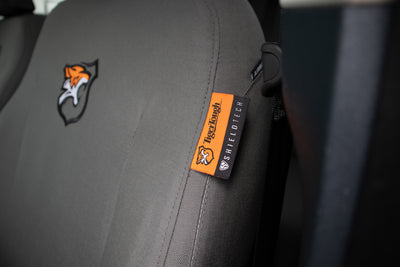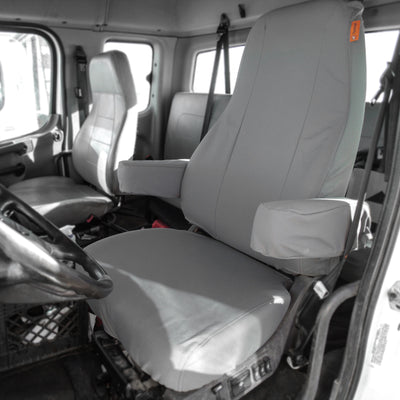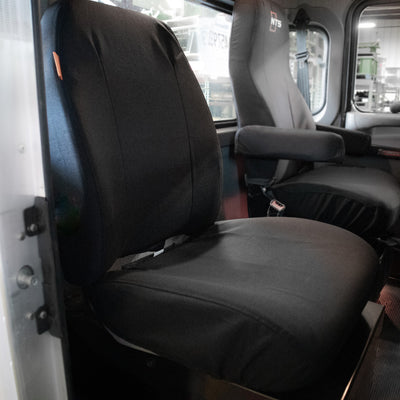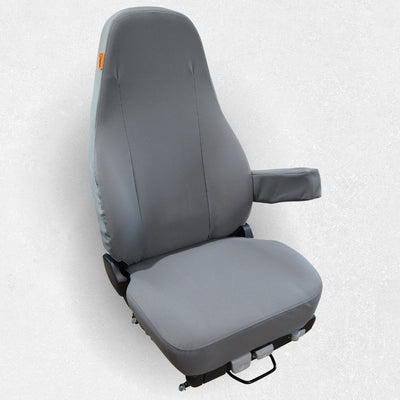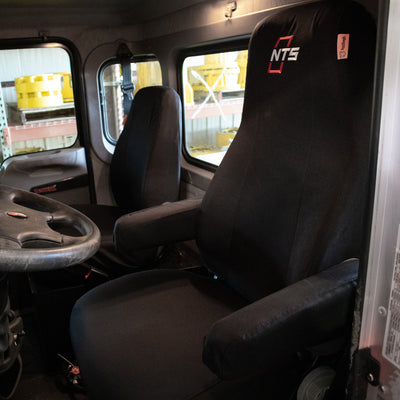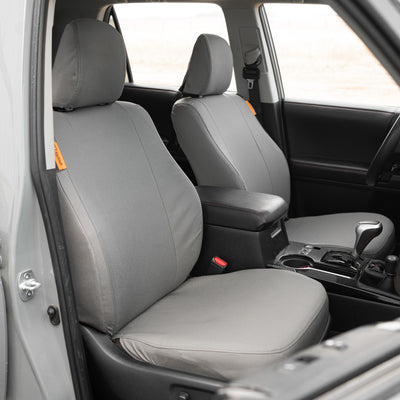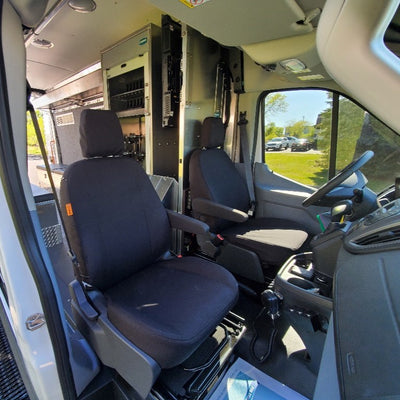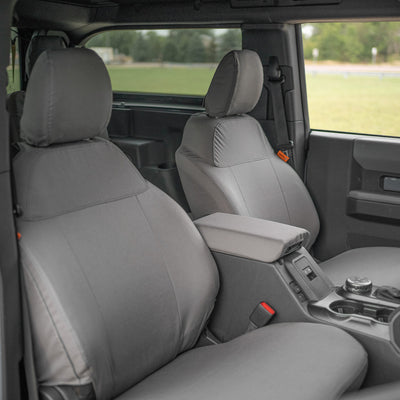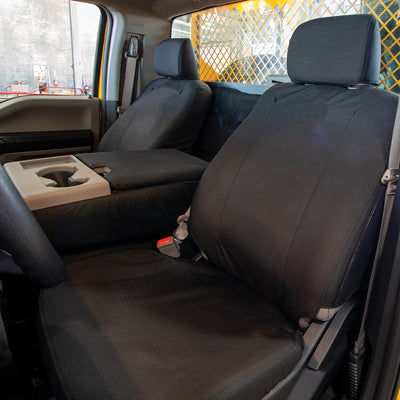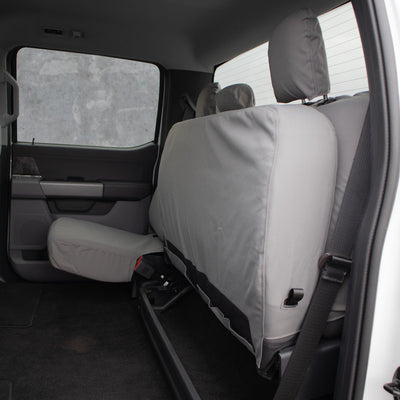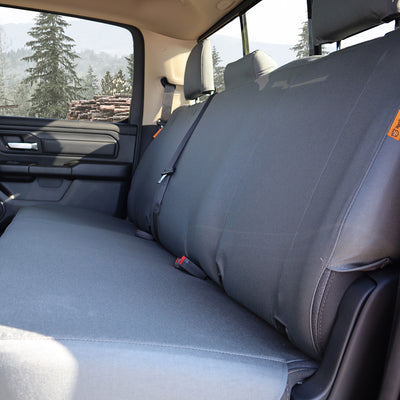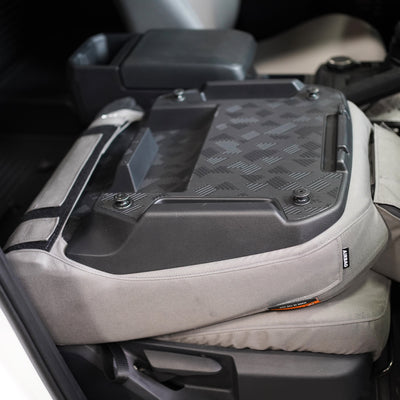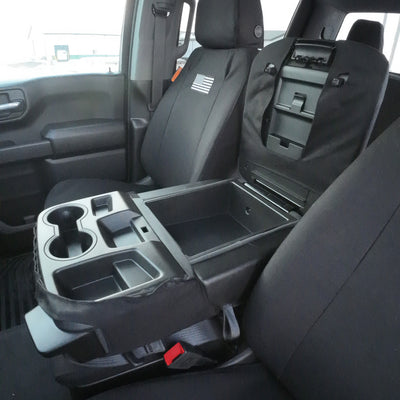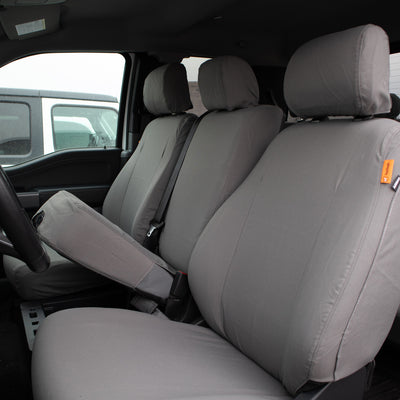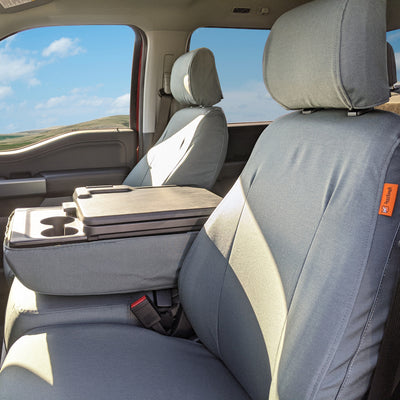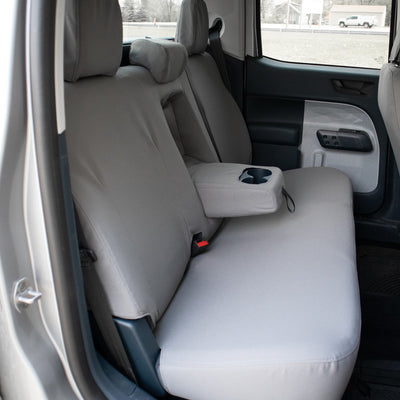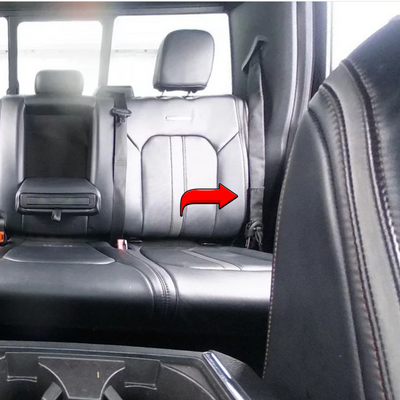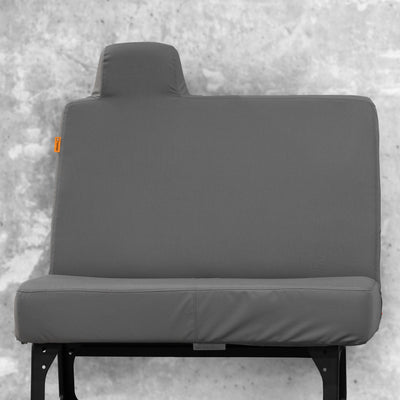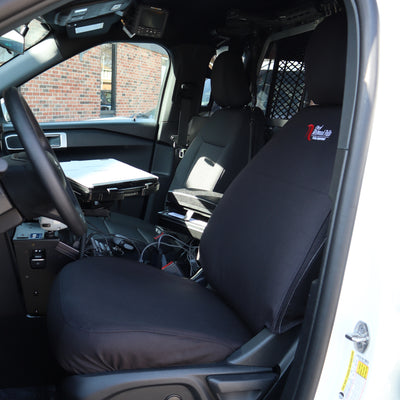Durability Lab Results: Carhartt vs. TigerTough
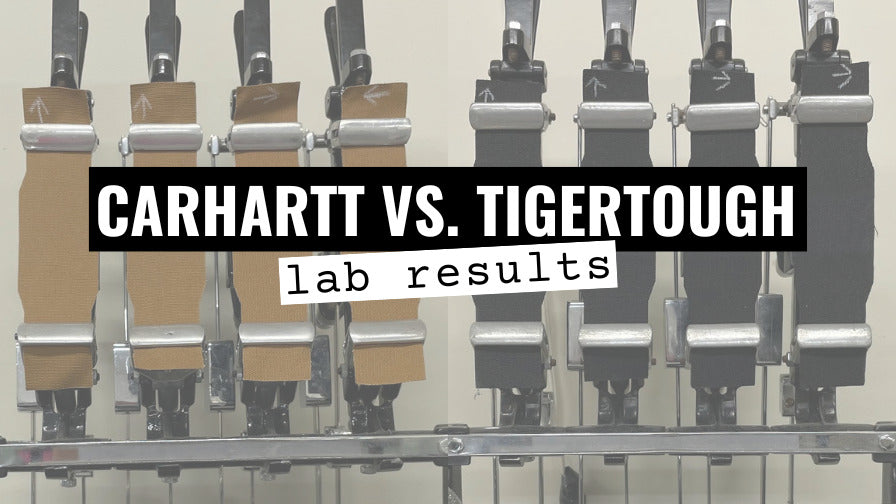
Durability isn't just a nice-to-have in a seat cover; it's an essential. Whether you're in the construction business, managing a fleet of delivery vehicles, or just an everyday driver who values the longevity of your truck's interior, the quality of your seat cover material plays an important role in protection. But here's the deal: not all seat covers are created equal.
So, how do you cut through the marketing jargon and truly measure the toughness of a seat cover?
Well, in our case, we shipped off two seat covers to an independent textile testing lab.
So here’s the in-depth, third-party laboratory comparison between TigerTough's 1000-Denier CORDURA®️ and Carhartt's renowned Cotton Duck. No biases—just raw data.
In this report, we'll lay out the results of tests conducted on these materials, shedding light on their abrasion resistance, puncture resistance, and tear resistance.
If you don’t want to read this entire report, we’ll just tell you now that TigerTough surpasses Carhartt in all three categories. But if you want the details, by all means, keep reading.
Testing isn’t the most exciting thing, and we could get hyper-nerdy about this, but we hope that by the end, you'll have a clearer picture of which material stands tall when faced with the daily wear and tear of rugged use.
The Importance of Third-Party Testing
Here's why third-party testing is an indispensable part of the product development and marketing process:
- Objective Assessment
- Credibility Boost
- Consistent Standards
- Unbiased Feedback
- Leveling the Playing Field
We've already compared Carhartt vs. TigerTough side-by-side, but we wanted to see which one would be more durable. Since we don't have that kind of equipment, we worked with an independent lab.
The Lab of Choice: TexTest
TexTest stands as a pinnacle in fabric testing, with over 30 years of distinguished experience. Recognized for assisting brands in certifying product specifications, TexTest ensures compliance with government regulations and adherence to elite industry standards.
Their credibility is fortified by an ISO 9001 quality management system, guaranteeing consistent and accurate results. This rigorous standardization accelerates the market entry for businesses, relying on TexTest's dependable evaluations.
Furthermore, TexTest's comprehensive array of advanced lab equipment offers an expansive suite of testing services. Their commitment to innovation is evident through active memberships in ASTM, AATCC, AFMA, and IFAI, ensuring they remain at the vanguard of testing methodologies.
Not only are they ANAB accredited, but they're also an officially approved testing lab. That's the expertise and assurance needed for an independent testing facility.
Materials Under Test
The material used in seat covers is pivotal in determining longevity, durability, and overall performance.
TigerTough 1000-Denier CORDURA®️ (Black)
Derived from a blend of nylon and other synthetic fibers, CORDURA®️ is renowned for its resilience and durability. The term "1000-Denier" refers to the fabric's density, with "denier" as a fiber thickness measurement unit. A higher denier indicates a thicker, more robust fabric.
Carhartt Cotton Duck (Brown)
"Duck" in fabric terminology refers to a heavy, plain-woven cotton fabric. The term "duck" comes from the Dutch word for cloth, "doek." Carhartt's variant, known for its ruggedness, is unapologetically sturdy and has been a staple in workwear for decades.
The Testing Parameters
When assessing the quality and durability of fabric materials, especially those designed for rugged use like seat covers, there are specific benchmarks and tests that experts rely on. These tests are designed to simulate the kind of wear and tear these materials might face in real-world conditions. For our evaluation of CORDURA®️ and Carhartt Cotton Duck, we focused on three main testing parameters:
- Wyzenbeek Abrasion Test (ASTM D4157): This test evaluates how well a fabric can resist wear from repeated rubbing. Think of it as simulating the repeated action of sliding in and out of a seat or the consistent contact of a seatbelt against the material.
- Puncture Resistance (ASTM D751 Flat Tip Probe): Here, we gauge how the material stands up against punctures from sharp objects. This is vital for those unexpected moments when a sharp tool or object ends up on the seat.
- Tear Resistance (Trapezoid Method ASTM D 4533): This test determines the material's ability to resist tearing, especially critical for situations where there's a strain on the fabric, such as when something gets caught on it.
But before we dive deeper into these tests, let's clarify two terms we'll reference quite a bit: 'warp' and 'filling.'
Warp Yarns: These yarns run lengthwise in a fabric parallel to the edge. They are typically more robust and tightly wound than filling yarns.
Filling Yarns (or Weft Yarns): These yarns run perpendicular to the warp, going across the width of the fabric. They interlace with the warp yarns to form the fabric's structure.
Understanding these terms isn't necessary, but these influence the fabric's strength and durability in different directions.
Wyzenbeek Abrasion Test (ASTM D4157)
In the fabric industry, one of the most trusted methods to measure a material's resistance to wear and tear is the Wyzenbeek Abrasion Test.
The Wyzenbeek Test simulates the action of everyday wear and tear on fabrics. A piece of the fabric is stretched over a frame, and then a specific kind of abrasive, such as a wire screen or a standardized piece of cotton duck, is rubbed against it. The number of cycles, or double rubs, it takes for the fabric to show noticeable wear or breakdown provides a measurable and consistent standard of durability. The more cycles a fabric can withstand before showing wear, the more durable it is.
TigerTough Results
Warp: 1,700,000+ cycles before wear
Filling: 1,700,000+ cycles before wear
Carhartt Results
Warp: 1,670,000 cycles before wearing completely through
Filling: 1,670,000 cycles before wearing completely through
Comparative Analysis
While both materials showcased exceptional durability, the TigerTough 1000-Denier CORDURA®️ demonstrated a particularly impressive performance. Remarkably, it maxed out the test at 1,700,000 cycles in warp and filling directions. This means that the test's limit was reached, so we don't even know how much further TigerTough could have gone.
Carhartt Cotton Duck, on the other hand, exhibited strong durability, reaching 1,670,000 cycles in both testing directions. While commendable, the distinction is clear: TigerTough's CORDURA®️ not only surpassed Carhartt but showcased the potential for even greater resilience that couldn't be quantified in this test, suggesting it provides an even longer-lasting seat cover in real-world scenarios.

Puncture Resistance (ASTM D751 Flat Tip Probe)
Puncture resistance is a crucial parameter when considering the strength and longevity of fabrics, especially in contexts where they may be exposed to sharp objects or sudden impacts. It's the measure of a fabric's ability to withstand penetration, a key determinant in its ability to protect underlying surfaces and, by extension, maintain its integrity over time. Whether it's for seat covers exposed to tools, equipment, or any accidental contact with sharp items, this test provides a snapshot of how well a fabric might hold up against potential damage.
Puncture resistance is necessary. A seat cover might look great and feel comfortable, but its utility is greatly diminished if it easily gives way to things like a screwdriver or dog claws.
TigerTough Results
The results varied depending on the direction of the probe, with scores of 120, 114, and 136, resulting in an average of 120 lbf.
Carhartt Results
The Carhartt fabric tested at 48, 40, and 36 in different directions, averaging 41 lbf.
Comparative Analysis
TigerTough's 1000-Denier CORDURA®️ exhibited an outstanding performance in the puncture resistance test. On average, TigerTough was approximately 193% stronger than Carhartt. This substantial difference underscores TigerTough's enhanced ability to withstand punctures, providing superior seat protection. Carhartt's performance, while still commendable, was significantly outshined by TigerTough in this regard, highlighting the enhanced protective qualities the latter offers.
Tear Resistance (Trapezoid Method ASTM D 4533)
Tear resistance is one of the essential indicators of fabric durability, especially when subjected to rigorous use. Tear resistance gauges a fabric’s capacity to prevent a small rip or cut from becoming a gaping wound in your seat cover.
Significance in Industrial and Rugged Environments
In industrial or rugged environments, fabrics often encounter various stresses, from snagging on equipment to being caught between sharp or heavy objects. A seat cover's integrity isn't just about withstanding the initial damage but also ensuring that minor damage doesn't escalate into major, irreparable harm. A high tear resistance means that even if the fabric does get nicked or slightly cut, the damage is localized and doesn't spread, thereby maintaining the overall integrity of the seat cover.
TigerTough Results
Warp: The fabric exhibited a tear strength of 103 lbs.
Filling: Recorded a tear strength of 96 lbs.
Carhartt Results
Warp: Demonstrated a tear strength of 20 lbs.
Filling: Registered a tear strength of 20 lbs.
Comparative Analysis
The numbers speak for themselves. TigerTough's 1000-Denier CORDURA®️ exhibits remarkable tear resistance, significantly outperforming the Carhartt Cotton Duck. Depending on the direction of the tear, TigerTough's fabric is between 380% to 415% more resilient in tear strength than Carhartt's.
Summary of Results
Wyzenbeek Abrasion Test (ASTM D4157):
TigerTough: Reached over 1,700,000 cycles, which is the test's maximum limit, implying its true potential remains undetermined.
Carhartt: Scored 1,670,000 cycles.
Statistical Insight: Despite the numbers being close, it's important to highlight that TigerTough's fabric hit the test's ceiling, hinting at even greater durability. On the other hand, Carhartt's fabric, while commendable, did not max out the test. This can translate to noticeable differences in fabric longevity and wear in real-world scenarios.
Puncture Resistance (ASTM D751 Flat Tip Probe)
TigerTough: Registered a puncture strength of 120 lbf.
Carhartt: Recorded 41 lbf.
TigerTough's fabric showcased a puncture resistance 193% stronger than Carhartt's. This means a significantly better defense against accidental stabs from tools, sharp objects, excited dogs, or other potential hazards.
Tear Resistance (Trapezoid Method ASTM D 4533)
TigerTough: In the warp direction, the strength was 103 lbs, and 96 lbs in the filling direction.
Carhartt: Tear strengths stood at 20 lbs for warp and 20 lbs for filling.
Statistical Insight: TigerTough's fabric is between 380% to 415% stronger in terms of tear resistance than Carhartt's, depending on the tear direction. This difference can mean a minor fabric stretch and a full-blown tear for industries or scenarios with rugged use.
Overall Analytical Impression
All data shows that TigerTough's 1000-Denier CORDURA®️ as the superior fabric in every metric tested.
Every percentage point of difference could signify additional weeks or even months of product life, fewer replacements, increased savings, and an overall enhanced user experience. In a world where durability and functionality are paramount, these test results offer clear guidance on which fabric stands out as the better choice.
Whether you choose TigerTough or another seat cover brand, we want you to be fully equipped with the information so that you can make the best investment for your vehicle.
Recent Posts

Case Study: 93,000 miles in a contractor's GMC Sierra

Marathon Seat Covers by Covercraft vs. TigerTough






